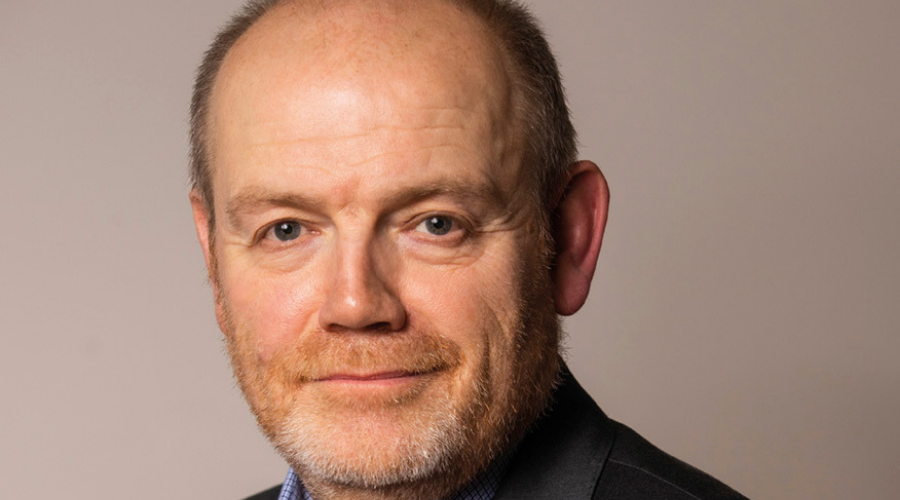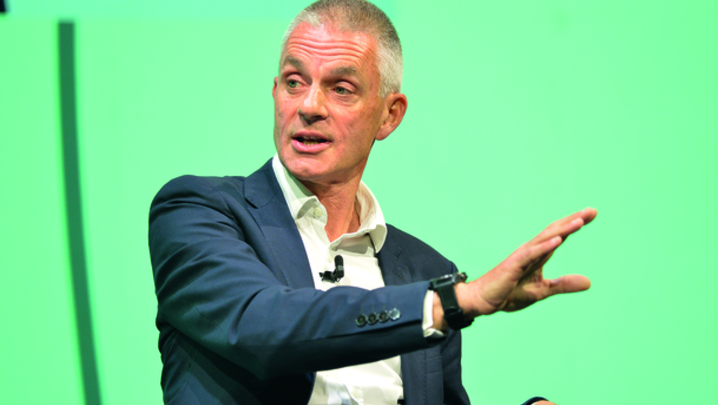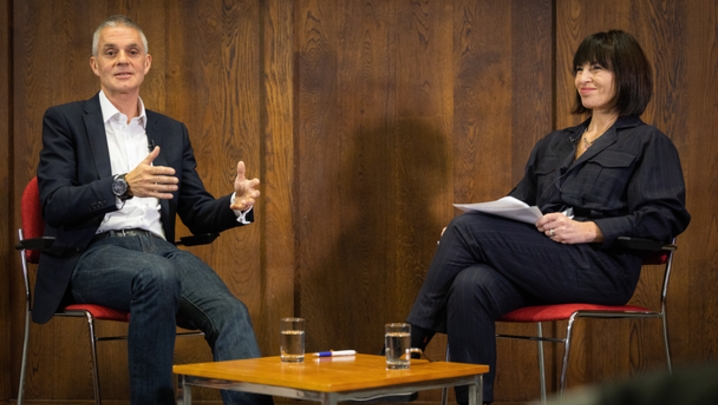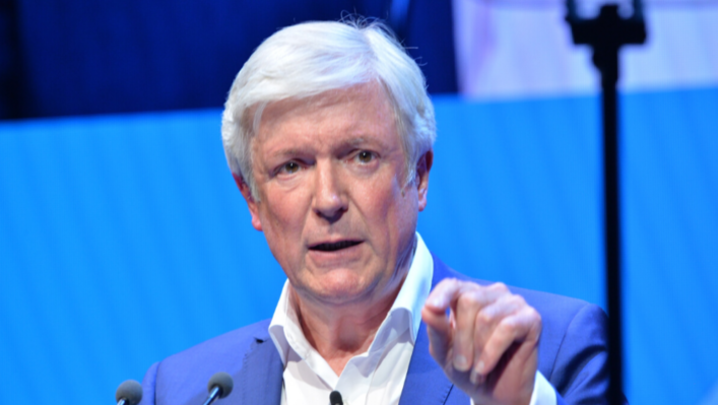Mark Thompson argues that policymakers need to rethink their attitude towards the BBC – or risk total US cultural dominance
The UK is facing “a total loss of cultural sovereignty”, which risks leaving the country culturally impoverished unless action is taken to stop US giants such as Netflix from dominating the media landscape.
This was the frank message from Mark Thompson, the former Director-General of the BBC who, for seven years since 2012, has been engaged in a wholesale transformation of The New York Times from a print company into a digital-based global news operation with 5 million subscribers.
In the third Steve Hewlett Memorial Lecture, he warned that, while “no one wants to see the UK turn into a cultural Airstrip One, it’s a clear and present danger. With newspapers struggling and broadcasters outgunned, I fear only effective and salient government media policy stands between Britain and a total loss of cultural sovereignty.”
He argued that it was mistaken for broadcasters and media companies to think they can “cut themselves to a secure future”, despite all of the pressures they are under, because “it is a strategy that leads off the cliff”.
Thompson pointed out that “heavy investment in content is Netflix and Disney’s strategy. Distinctiveness is a no-brainer if you truly believe you can succeed as a high- quality content provider of any kind. You can’t degrade your journalism and hope to keep your audience, let alone sell them subscriptions.”]
He added: “Our culture comprises more than media… but I don’t think anyone would dispute the centrality of media – digital media, traditional TV and radio, movies, newspapers and magazines, local and national – in most of our lives.
“But many of these categories… are under economic and audience threat from a process of digital disintegration and reinvention that is still accelerating, in many areas just getting going, and particularly from its globalising effects.”
Advertising-supported companies, including ITV and Channel 4, needed to drastically rethink their models, but he was gloomy about the prospects of any of them scaling up or becoming global forces. He supported Channel 4 and the BBC’s moves outside of London as a means of more truly reflecting the Brexit-divided country.
The only UK media organisation with the potential to become a truly international force was the BBC. But it had been “hobbled by British policy making” over the past decade. This was preventing it from fulfilling its full potential, and being recognised by people around the world.
“British media has changed greatly since I moved to New York seven years ago.” But policymakers had “largely concentrated on tightening the funding pressure and other constraints on the BBC”.
He described the corporation’s 2016 Charter, which imposed the cost of free licences for the over-75s on the BBC, as “disastrous”. “It was blatantly expedient and obviously flawed. At least, having agreed to give the BBC the freedom to reform the entitlement, [the government should] let it get on with it without hindrance.”
"It’s rubbish to say that the young won’t listen to serious speech"
Instead, [the corporation] should have been unleashed and enabled to project a British cultural perspective through its creative talent – from programming to news – to audiences everywhere and not just in the troubled global hotspots.
“The BBC should be a winner as the only British media brand with true global recognition and potential, and with a huge international audience,” Thompson maintained. “Equally damaging has been the officious government and regulatory environment that has sought to stymie or limit digital transformation and innovation by the BBC as much as possible.”
He lamented the 2009 Competition Commission decision to block Project Kangaroo, a proposed BBC-led, UK-wide streaming service with a pay element to rival Netflix at the point that it was transforming from a DVD outfit into a streamer. As Director-General at that point, he had championed the move as the next step after the introduction of the BBC iPlayer. BritBox, launched by ITV and the BBC, had then taken “eight years – an eternity” – to surface.
“Please let’s learn the lesson… and let them collaborate more freely with each other ,and the BBC… can help with innovation and scale. Government media policy needs to change. Instead of a policy of ‘No, you can’t, it’s too dangerous’, it needs to turn into a policy of ‘Yes’.”
Thompson said the refusal to date “speaks to a peculiarly British approach to the BBC and media policy broadly, which is to talk global but act parochial. In our blinkered discourse about media, the more extravagant the talk of global opportunity, the more narrow and inward-facing the true world view.”
He stressed: “Policing the beach for litter is virtuous. But it’s time to glance out to sea. That grey band on the horizon is a tsunami.... I enter this debate with experience of leading a large-scale response to the digital tsunami. Successful transformation is possible for legacy players who accept drastic change.” But it needed resources and scale. “We are unavoidably in a capital-intensive media period.
“The NYT now has 900 people working in digital areas, in addition to journalists. Building an ark does not come cheap.”
Broadcasters were undergoing the same ominous early-stage audience loss that hit the West’s newspapers years ago, particularly the flight of the young. “Radio will probably fare better [because] it’s sticky and relatively cheap to make”.
"You can’t degrade your journalism and hope to keep your audience"
He added: “I grew up in broadcasting being told that very few young people would ever listen to serious speech audio. It’s rubbish to say that the young won’t listen to serious speech.”
While it might be convenient to blame Google and Facebook for media’s woes, and regulators had many searching questions about their business practices, “the true culprit is the internet, which allowed users to switch from old media distribution channels to digital. It robbed newspapers and is beginning to rob linear-TV of the ad-pricing power of the old methods. It can’t be un-invented.” It had to be harnessed.
Quality was key to the global TV battle, too. The streamers were backing “the kind of distinctive, ambitious programming that used to be reserved for premium cable and satellite – HBO or Showtime, say – or, indeed, the BBC and Channel 4. So it’s not reality shows and soaps, but Fleabag and The Crown. The best US linear-TV players are fighting back with the same: The Terror, Chernobyl, in some respects even Game of Thrones.”
Thompson suggested: “The good news is that the future of Britain’s writers, actors, directors, producers, designers, crafts and best journalists looks better than ever. The production sector had a record £3bn in revenues last year…
“But that’s where good news largely runs out as media divides into global winners, probable survivors and the rest.”
Mark Thompson’s speech, ‘A question of sovereignty: Brexit, digital disruption and the fate of British media’, was the third Steve Hewlett Memorial Lecture, a joint initiative by the Media Society and the RTS. It was delivered at Westminster University, London, on 24 September. The producer was John Mair. Report by Maggie Brown.
How The New York Times went digital
Mark Thompson said that ‘a seemingly intractable set of threats faced The New York Times in late 2012’, when he took over. Its website, launched a year earlier, might have been viewed as a market leader, with 600,000 subscribers, but print advertising, print subscribers and news-stand sales were all falling. After years of growth, digital advertising was going into reverse.
It was operating in an industry where two-thirds of US newspaper jobs had been lost since 2004, and one in five titles had closed amid frightening market conditions, but it possessed advantages and scale.
‘We had strengths to build on, untapped global potential, heritage branding and a board/controlling family determined not to savage the newsroom,’ he said. Despite this, it had not properly adapted its operations to the new digital world. ‘There is a difference between trying something digital and trying as if the company’s life depended on it.
Instead of cutting, ‘we doubled down on distinctiveness, to be more valuable than anything available for nothing on the internet. A strategy of delivering, in return for a regular fee. It’s a no-brainer, if you truly believe you can succeed as a provider of high-quality content of any kind.’ Research showed that readers valued the paper’s mission, ‘to seek out truth and help people understand the world’.
Thompson continued: ‘A good slice of our investment has gone into building classic journalistic breadth and strength. Take investigations. ‘You’ll be familiar with some of the Times’s work in the field of investigations – Harvey Weinstein and Bill O’Reilly, Trump’s taxes and so on – but what I want to stress is the sheer volume of original work that The New York Times delivers every week, a scale of high-impact stories previously unheard of anywhere in digital, print or broadcasting.’
It also moulded itself to the lifestyle of the busy, more youthful subscribers it needed to recruit to thrive. ‘From 2014, we focused most on mobile phones – that was where users were. Peak time for news use on mobile phones is 7:00am, so the whole circadian rhythm of the newsroom had to change.’
"The future is bleak unless [players] pivot away from… advertising to subscriptions"
The operation also added items, to keep subscribers hooked: a morning mini crossword; cooking products; a breakthrough podcast, The Daily, which is now reaching 10 million listeners every month.
It remains a fight for survival: ‘You have to throw everything and almost everyone into this fight. At any moment, we have multiple, simultaneous experiments running in the field. A generation of new leaders came in. We massively expanded training. Changes were quite painful: in some sections, the need for different expertise meant an 85% change in the workforce.’
The paper started taking international digital subscriptions seriously and Thompson said this was a growth area. ‘Today, growth in digital revenue comfortably outstrips print losses. At the end of our most recent quarter, we had around 5 million total subscriptions, triple the highest achieved in the print era. We plan to double that again to 10 million by 2025.
‘This is very applicable to UK media. Digital advertising cannot support quality journalism on its own. The future is bleak unless others pivot away from dependence on advertising to subscriptions or other streams. That includes former digital darlings such as HuffPost and BuzzFeed.’
Thompson sounded a note of caution: ‘So far, the only digital models in news likely to become viable in future are at the very top of the market, if your journalism is good enough to buy.’ He thought the Daily Mail and The Guardian were among the UK newspapers that might be survivors.
‘An effective digital media operation,’ he said, ‘is a massive undertaking. Ignorant leadership is deadly. No one can bluster or lobby their way out of this one.’






